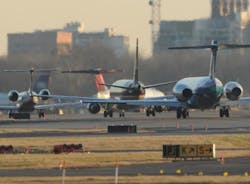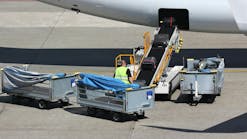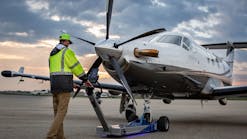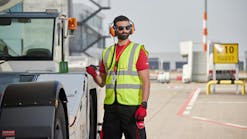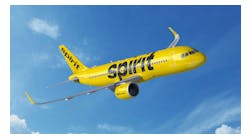The days of being stuck for hours on a plane on an airport's tarmac appear to be over.
From January through June, only four planes carrying passengers on flights within the U.S. sat for longer than three hours, the Transportation Department reported Thursday.
That compares with 35 tarmac delays for domestic flights during the same period last year, which was the first full year that a new government rule preventing long tarmac delays took effect.
The government imposed limits in April 2010 after a series of incidents in which passengers were stranded on planes for more than 10 hours. In the first six months of 2009, for instance, there were 586 tarmac delays of more than three hours.
The rule on domestic flights requires airlines to let passengers off a plane if they have been waiting on a tarmac for more than three hours. Exceptions are made only if the delay is for safety, security or air traffic control-related reasons.
Carriers face steep fines if they break the rule -- up to $27,500 per passenger. Only one airline has had to pay up. Last year, the Department fined American Eagle, the regional unit of American Airlines, $900,000 for lengthy delays at Chicago's O'Hare airport in May 2011.
"Our new airline consumer rules and our vigorous oversight of the aviation industry are holding airlines accountable to their customers," Transportation Secretary Ray LaHood said. "We will continue to help make air travel as hassle-free as possible."
Since August 2011, the tarmac delay rule has also applied to U.S. and foreign airlines operating international flights at U.S. airports. The limit in those cases is four hours, however. In June, there was just one long tarmac delay on an international flight.
"Airlines are focused on improving service and efficiency for customers, and thanks to systemic operational improvements, mild weather and 20% fewer flights from five years ago, customers are benefiting as airlines continue to set impressive on-time arrival records and dramatically reduce lengthy delays," says Steve Lott, a spokesman for the industry group Airlines for America.
Airlines had opposed the tarmac rule, arguing it would force them to cancel more flights. And while it hasn't eliminated all but the longest of delays, some analysts say it may have prompted airlines to cancel more flights rather than pay penalties.
"The 'three-hour rule' very quickly becomes a 90-minute rule in actual decision-making practice, which indisputably causes more pre-emptive cancellations than otherwise would be the case," says Robert Mann, president of R.W. Mann and Co., which provides industry analysis.
The department has instituted a number of other new consumer protections in recent years, including a requirement that airlines post on their websites the on-time performance of their flights.
Other data released by the Department's Bureau of Transportation Statistics showed carriers are continuing a streak of getting passengers and their luggage to their destinations on time.
The 15 largest U.S. airlines were on time 83.7% of the time during the first six months of this year, the highest for any comparable period in the 18 years the department has been collecting data. The previous high of 82.8% had been set in 2003.
Airlines also canceled the fewest flights in the past 18 years. The 1.1% cancellation rate for the six-month period bested the previous record of 1.3% in 2002.
The carriers posted their lowest rate of mishandled baggage for any January to June since the department started collecting the data in September 1987. There were just 2.97 reports of mishandled bags for every 1,000 passengers, down from 3.60 the same period last year.
Alan Bender, professor of aeronautics at Embry-Riddle Aeronautical University, says airlines have been more on time partly because they haven't had to contend with as many major weather events as they've had to in the past.
But he also points out that they have cut back on the number of flights they operate to more evenly meet the demand for travel and to make money.
Still, he says, there's been a fundamental change in operational philosophy because of Transportation Department rules.
"The philosophy before was, above all else, to move airplanes and crews -- those were the most important things," he says.
"Today airlines have been forced to give equal importance to passenger comfort lest they be fined millions and get terrible publicity.
"We can still get an occasional 'snowmageddon' as we did a couple of years ago -- and that will foul up everything, but it will also be excused if airlines make their best effort."
Copyright 2012 Gannett Company, Inc.All Rights Reserved
